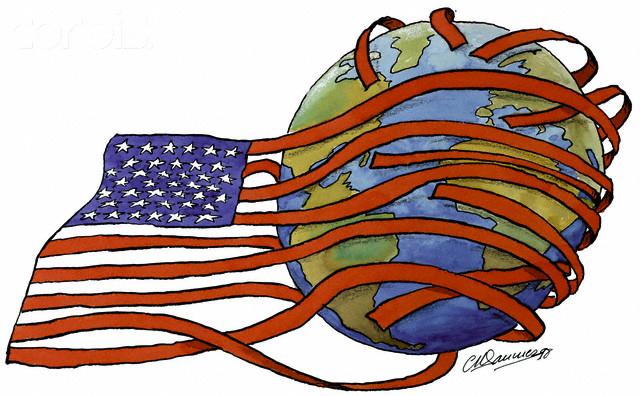With Trump at the Helm, US Imperialism Loses Its Mask

US President Donald Trump's remarks about Haiti, El Salvador and African countries have enraged people around the world.
"Why are we having all these people from shithole countries come here?" the US President is reported to have asked legislators on Thursday while discussing protecting immigrants from these countries as part of a bipartisan immigration deal at the White House.
Trump also said that the US should instead bring more people from countries such as Norway.
These are in line with the long list of comments that Trump has made over the years which smack of white supremacism, bigotry and contempt for the people of the third world.
He had called Mexican immigrants “rapists” who are “bringing crime” and “bringing drugs” into the US as he launched his presidential campaign in 2015. He had, as a candidate, proposed a “total and complete shutdown of Muslims entering the United States”. As President, he has put in place a ban (which is being contested in the courts) on people from six Muslim-majority countries from entering the US.
Trump often retweeted supportive messages from white supremacists and neo-Nazis during his election campaign, even when the users’ profile pictures clearly indicated their political affiliation.
After white supremacists protested in Charlottesville in August 2017, Trump defended them, saying they included “some very fine people”.
And in September 2017, in his first address to the United Nations General Assembly, Trump threatened to “totally destroy North Korea”.
The United States had its origins in the genocide of Native Americans, and it grew by enslaving millions of black people from the African countries that Trump derided. It thrived on invading and looting numerous countries and massacring millions across the world, from Korea and Vietnam to Iraq and Libya. The US, through military aggression, coups and support to military regimes, has played a big role in keeping Haiti and El Salvador – which were also mocked by Trump – impoverished.
In short, destroying entire countries, wiping out entire populations, and devastating entire civilisations have all been part of US foreign policy for long. Selling this to the American public required a certain level of acceptance among them for the argument that the lives of the people of the third world are less valuable than those of the white people of the United States.
US administrators and military leaders have often not been coy about stating this explicitly.
Dean Rusk, a supporter of the war and later Secretary of State, gloated about the American atrocities in the Korean War when he said that the US bombed "everything that moved in North Korea, every brick standing on top of another." Three million Koreans died in the war, mostly in North Korea.
General William Westmoreland, who commanded US forces during the Vietnam War from 1964 to 1968, and who served as Chief of Staff of the US Army from 1968 to 1972, had notoriously referred to the Vietnamese as “termites”.
In 1996, Madeleine Albright, who was then the US Ambassador to the UN, said that the price of the American attempts to “punish” Saddam Hussein – the death of half a million children due to US-led sanctions against Iraq – was “worth it”.
In 2008, Hillary Clinton, then hoping to become the Democratic presidential candidate, had said that the US could “totally obliterate” Iran, a country with a population of 73 million at the time.
The term of the “suave” and “sophisticated” Barack Obama saw the US bombing seven countries – Iraq, Afghanistan, Pakistan, Somalia, Yemen, Libya and Syria. American barbarism in Iraq and Syria gave birth to more barbarism in the form of the Islamic State. The destruction of Libya resulted in slave trade returning to the country.
As celebrated Australian journalist John Pilger pointed out in an incisive article in September 2017, “this is the American Way; only the euphemisms are missing now” with Trump at the helm of affairs.
Trump’s remarks have been condemned by people across the world.
"Trump insults the world and demonstrates his opinions and politics are contaminated by capitalist racism, fascism, arrogance and ignorance," said Evo Morales, the President of Bolivia.
Large sections of Americans have also expressed indignation at the remarks of the US President. But as Pilger points out, there are no signs yet of mass movements against imperialism and war, such as those which were visible in the 1970s and 1980s in the United States.
Real change would come when people's movements develop and gather the strength to vigorously oppose, not merely reprehensible remarks, but also the actions of the US government which seek to turn countries into “shitholes”.
Get the latest reports & analysis with people's perspective on Protests, movements & deep analytical videos, discussions of the current affairs in your Telegram app. Subscribe to NewsClick's Telegram channel & get Real-Time updates on stories, as they get published on our website.























